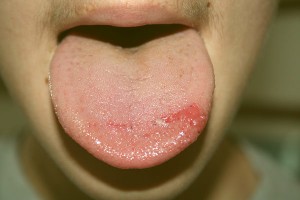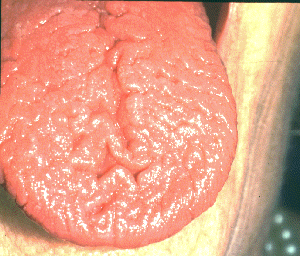Burning mouth syndrome (BMS) is characterized by a burning sensation or pain inside the oral cavity and is accompanied by a distinct metallic taste or an alteration of the tongue’s taste buds. The pain is usually chronic and may affect the tongue, lips, gums, palate, cheeks or the mouth as a whole. BMS could happen to anyone but it is more common in older women. The cause for this condition is hard to detect so the doctor or the dentist would closely investigate the patient’s medical history and run some tests in order to find out the root cause of the patient’s BMS.
Burning mouth syndrome is also termed as glossodynia, scalded mouth syndrome, stomatodynia, burning lips syndrome or burning tongue syndrome.


Symptoms of Burning Mouth Syndrome
The most dominant symptom of burning mouth syndrome is pain or a burning sensation inside the mouth. The pain could be moderate or severe that persists for months or even years. Some patients experience irregular BMS, which means that the burning sensation in the mouth comes and goes. Below are the other symptoms for burning mouth syndrome:
- Dryness, scaling and itching of lips
- Dryness and soreness of mouth
- Feeling of thirst most of the time
- Numbness or tingling sensation on the tip of the tongue
- A progressive pain in the mouth which starts in the morning gets worse in the middle of the day, and then the pain ceases at night.
- A bitter metallic taste in the mouth
Causes of Burning Mouth Syndrome
The cause of BMS may either be primary or secondary. It is referred to as primary burning mouth syndrome if the origin is harder to detect or the cause is usually a mystery. It has been said that the cause is due to damage in some nerves in the central nervous system.
The secondary burning mouth syndrome is easier to identify. This means that the condition arose because of some major underlying disease or medical condition. Below are some of the secondary causes of burning mouth syndrome:
- Hormonal changes – This is very common in women especially if the woman is at her menopausal stage.
- Medicines – There are instances that the BMS is caused by the drug that the person is taking to treat a health condition. Examples of some drugs that may cause this ailment are anti-diabetic drugs and medications used to treat Sjögren’s syndrome.
- Nutritional deficiency – The lack of essential nutrients such as vitamin b complex, iron and zinc could also lead to burning mouth syndrome.
- Oral candidiasis – This is an oral fungal infection that gives a burning sensation in the mouth which gets worse when the person eats spicy and acidic foods.
- Dentures – Poorly attached dentures could irritate the muscles and the nerves in the oral cavity causing pain or burning sensation in the mouth. If the person is also allergic to the materials used in the dentures, these could also irritate the oral cavity.
- Psychological conditions – Psychological conditions such as anxiety and depression do not directly cause burning mouth syndrome, however, these could trigger habits that could result to the occurrence of BMS. Examples of these habits include thrusting of the tongue and teeth grinding. If a person repeatedly does these habits, it could result to blistering or scalding of the mouth and BMS could occur.
Treatment for Burning Mouth Syndrome
The management for burning mouth syndrome is intended to address the symptoms and treat the root cause. It should be noted that there is still no specific treatment for BMS alone. Below are some effective treatment options:
For psychological problems, oral antidepressant medications should help control the anxiety attacks that would trigger the person’s habits like teeth grinding.
- Topical capsaicin is also effective in relieving the burning sensation in the mouth.
- Sufficient intake of essential nutrients like vitamin b complex, iron and zinc
Below are also some of the things a person can do in order to relieve the symptoms of burning mouth syndrome:
Avoid using oral antiseptics or toothpastes that contain lauryl sulfate, cinnamon and high amount of alcohol
- Drink more water to relieve the dryness of mouth and throat
- Do not engage in stressful activities
- Avoid drinking alcoholic beverages and smoking tobacco
- Suck on ice cubes or chips to numb the pain in the mouth
- Avoid acidic and spicy foods such as soft drinks, chili flavored foods, and fruit juices
- Try using baking soda as toothpaste when brushing your teeth
Burning mouth syndrome has no specific cure and the only thing you can do is to try to assuage the symptoms of the said condition. The tips mentioned above can greatly help, but it is recommended to seek professional medical advice when the symptoms persist or keep on recurring.